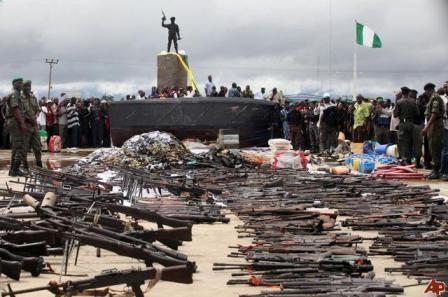The Presidential Amnesty Programme (PAP) has begun verification of 236 ex-agitators from Abia benefiting from the programme.
The Coordinator of the Programme, retired Brig.-Gen. Paul Boroh , gave the indication in an interview with the News Agency of Nigeria (NAN), in Abuja on Tuesday.
This followed the recent pronouncement by Vice President Yemi Osinbajo that youths from Abia and Imo must be included.
The vice president said their participation in the programme would help in reducing youth restiveness in the oil producing areas, adding that social and economic activities would be allowed to thrive.
Boroh, who is also the Special Adviser to the President on Niger Delta, said the 236 ex-agitators were earlier disarmed from 32 camps in the Niger Delta.
He restated Federal Government’s commitment to the welfare of all beneficiaries captured under its programme.
“The programme is as a result of empowerment and delegates are given starter-packs for their businesses.
“The office trains the ex-agitators at various vocational skill centres and educational institutions in Nigeria and abroad”, he said.
According to him, the mandate of the office is actually to reintegrate the agitators after their training.
“Some people could argue that getting jobs for them is part of reintegration. We have to look into that to see how we can get these persons properly reintegrated”, Boroh said.
The presidential aide said more than 500 ex-agitators were trained and graduated in advanced agriculture at the Bio Resource Centre in Odi, Bayelsa State.
“We will explore the opportunity provided by the Federal Government so that our delegates that had been trained can be gainfully employed’’, he said.
The presidential aide said agriculture was the real sector that should be encouraged at all levels so that the country’s economy could depend less on oil.
He stressed the need for the moribund industrial complexes in the region to be resuscitated so as to provide employment to the teeming youths, saying the major challenge in the region was unemployment.
Boroh identified the Aluminium Smelting Company in Akwa Ibom State, the Aladja Steel in Delta State and the various ports as the industries that should be put back to use and provide employment for tens of thousands of youths in the Niger Delta.
According to him, the importance of the programme lies in the sustenance of peace and enhancement of security in the region. (NAN)
AIR/OSA/IEA

